- Home
- Marge Piercy
Gone to Soldiers
Gone to Soldiers Read online
EARLY BIRD BOOKS
FRESH EBOOK DEALS, DELIVERED DAILY
BE THE FIRST TO KNOW—
NEW DEALS HATCH EVERY DAY!
Also by Marge Piercy
Novels
Going Down Fast, 1969
Dance the Eagle to Sleep, 1970
Small Changes, 1973
Woman on the Edge of Time, 1976
The High Cost of Living, 1978
Vida, 1980
Braided Lives, 1982
Fly Away Home, 1985
Gone to Soldiers, 1988
Summer People, 1989
He, She And It, 1991
The Longings of Women, 1994
City of Darkness, City of Light, 1996
Storm Tide, 1998 (with Ira Wood)
Three Women, 1999
The Third Child, 2003
Sex Wars, 2005
Short Stories
“The Cost of Lunch, Etc.”, 2014
Poetry Collections
Breaking Camp, 1968
Hard Loving, 1969
4-Telling (with Emmett Jarrett, Dick Lourie, Robert Hershon), 1971
To Be of Use, 1973
Living in the Open, 1976
The Twelve-Spoked Wheel Flashing, 1978
The Moon Is Always Female, 1980
Circles on the Water, Selected Poems, 1982
Stone, Paper, Knife, 1983
My Mother’s Body, 1985
Available Light, 1988
Early Ripening: American Women’s Poetry Now (ed.), 1988
Mars and Her Children, 1992
Eight Chambers of the Heart, 1995 (UK)
What Are Big Girls Made Of, 1997
Early Grrrl, 1999
The Art of Blessing the Day: Poems with a Jewish Theme, 1999
Colors Passing Through Us, 2003
The Crooked Inheritance, 2009
The Hunger Moon: New and Selected Poems, 1980–2010, 2012
Made in Detroit, 2015
Other Works
“The Grand Coolie Damn” in Sisterhood Is Powerful, 1970 (pamphlet)
The Last White Class, (play coauthored with Ira Wood), 1979
Parti-Colored Blocks for a Quilt, (essays), 1982
The Earth Shines Secretly: A Book of Days, (daybook calendar), 1990
So You Want to Write: How to Master the Craft of Writing Personal Narrative, 2001; Enlarged Edition, 2005
Sleeping with Cats, (memoir), 2002
Louder: We Can’t Hear You (Yet!), The Political Poems of Marge Piercy, 2004 (CD)
Pesach for the Rest of Us, 2007
My Life, My Body (Outspoken Authors), (essays, poems, and memoir), 2015
Gone to Soldiers
A Novel
Marge Piercy
The survivors have written their own books
and those who perished are too many and too hungry
for this to do more than add a pebble to the cairn
So this is for my grandmother Hannah
who was a solace to my childhood
and who was a storyteller even in the English
that never fit comfortably in her mouth
for the moment when she learned that of her
village, none and nothing remained
for her weak eyes, strong stomach and the tales
she told, her love of gossip, of legend
her incurable romantic heart
her gift for making the past
walk through the present
CONTENTS
LOUISE 1: A Talent for Romance
DANIEL 1: An Old China Hand
JACQUELINE 1: In Pursuit of the Adolescent Universal
ABRA 1: The Opening of Abra
NAOMI 1: Naomi/Nadine Is Only Half
BERNICE 1: Bernice and the Pirates
JEFF 1: Emplumado
RUTHIE 1: Ruthie’s Saturday
One Cold Sunday
JACQUELINE 2: Of Chilblains and Rotten Rutabagas
RUTHIE 2: Of Rapid Pledges
ABRA 2: Stories to Make the Ears Bleed
BERNICE 2: Bernice on Patrol
DUVEY 1: Many a Stormy Sea Will Blow
LOUISE 2: The Dark Horse
NAOMI 2: Today You Are a Woman
DANIEL 2: The Great Purple Crossword Puzzle
JEFF 2: The Creature from the Logey Swamp
JACQUELINE 3: A Star Shaped Like Pain
ABRA 3: Such a Roomy Closet
NAOMI 3: The Jaws Close
LOUISE 3: Afternoon Sun
JEFF 3: High Tea and Low Tricks
DUVEY 2: The Maltese Crossing
RUTHIE 3: Of Good Girls and Bad Girls
BERNICE 3: Bird on a Wire
MURRAY 1: One More River to Cross
DANIEL 3: Daniel’s War
JACQUELINE 4: Roads of Paper
JEFF 4: A Few Early Deaths
ABRA 4: Hands-on Experience
NAOMI 4: Home Is the Sailor
LOUISE 4: Something Old and Something New
JACQUELINE 5: Of Common Wives and Thoroughbred Horses
DANIEL 4: Their Mail and Ours
DUVEY 3: The Black Pit
RUTHIE 4: Everybody Needs Somebody to Hate
BERNICE 4: Up, Up and Away
ABRA 5: What Women Want
LOUISE 5: Of the Essential and the Tangential
JEFF 5: Friends Best Know How to Wound
NAOMI 5: One Hot Week
JACQUELINE 6: Catch a Falling Star
RUTHIE 5: Candles Burn Out
BERNICE 5: The Crooked Desires of the Heart Fulfilled
LOUISE 6: The End of a Condition Requiring Illusions
ABRA 6: Love’s Labor
DANIEL 5: Working in Darkness
MURRAY 2: A Little Miscalculation of the Tides
JEFF 6: A Leader of Men and a Would-be Leader of Women
NAOMI 6: A Few Words in the Mother Tongue
RUTHIE 6: What Is Given and What Is Taken Away
LOUISE 7: Toward a True Appreciation of Chinese Food
JACQUELINE 7: The Chosen
BERNICE 6: In Pursuit
ABRA 7: The Loudest Rain
DANIEL 6: Under the Weeping Willow Tree
JEFF 7: When the Postman Passes at Noon, Twice
NAOMI 7: The Tear in Things
JACQUELINE 8: Spring Mud, Spring Blood
RUTHIE 7: Woman Is Born into Trouble as the Water Flows Downward
BERNICE 7: Major Mischief
LOUISE 8: I Could Not Love Thee, Dear, So Much
ABRA 8: The Great Crusade
JEFF 8: The Die Is Cast
RUTHIE 8: Almost Mishpocheh
MURRAY 3: Return to Civilization
JACQUELINE 9: An Honorable Death
LOUISE 9: Rations in Kind
NAOMI 8: The Voice of the Turtledove
DANIEL 7: Flutterings
JACQUELINE 10: Up on Black Mountain
BERNICE 8: Of the One and the Many
LOUISE 10: The Biggest Party of the Season
ABRA 9: The Grey Lady
RUTHIE 9: Some Photo Opportunities and a Goose
JACQUELINE 11: Arbeitsjuden Verbraucht
MURRAY 4: The Agon
BERNICE 9: Taps
DANIEL 8: White for Carriers, Black for Battleships
NAOMI 9: Belonging
JACQUELINE 12: Whither Thou Goest
ABRA 10: When the Lights Come on Again
RUTHIE 10: A Killing Frost
LOUISE 11: Open, Sesame
MURRAY 5: An Extra Death
JACQUELINE 13: Tunneling
DANIEL 9: Lost and Found
BERNICE 10: Some Changes Made
LOUISE 12: The Second Gift
RUTHIE 11: The Harvest
JACQUELINE 14: L’Chaim
ABRA 11: The View from Tokyo
NAOMI 10: Flee as a Bird to Your Mountain
AFTER WORDS: Acknowledgments, a complaint or two and many thanks
About the Author
LOUISE 1
A Talent for Romance
Louise Kahan, aka Annette Hollander Sinclair, sorted her mail in the foyer of her apartment. An air letter from Paris. “You have something from your aunt Gloria,” she called to Kay, who was curled up in her room listening to swing music, pretending to do her homework but being stickily obsessed with boys. Louise knew the symptoms but she had never learned the cure, not in her case, certainly not in her daughter’s. Kay did not answer; presumably she could not hear over the thump of the radio.
Personal mail for Mrs. Louise Kahan in one pile. The family stuff, invitations. An occasional faux pas labeled Mr. and Mrs. Oscar Kahan. Where have you been for the past two years? Then the mail for Annette Hollander Sinclair in two stacks: one for business correspondence about rights, radio adaptations, a contract with Doubleday from her agent Charley for the collection of stories Hidden from His Sight. Speaking engagements, club visits, an interview Wednesday.
The second pile for Annette was fan mail, ninety-five percent from women. Finally a few items for plain Louise Kahan: her Daily Worker, reprints of a Masses and Mainstream article she had written on the Baltimore shipyard strike, a book on women factory workers from International Publishers for her to review, William Shirer’s Berlin Diary.
Also in that pile were the afternoon papers. Normally she would pick them up first, but she could not bring herself to do so. Europe was occupied by the Nazis from sea to sea, an immense prison. Everywhere good people and old friends were shot against walls, tortured in basements, carted off to camps about which rumors were beginning to appear to be more than rumor.
She leaned on the wall of the foyer, gathering energy to resume her life, to walk into the emotional minefield that lately seemed to constitute her relationship with Kay. The foyer was the darkest room of the suite, for the living room, her office and Kay’s bedroom enjoyed views of the Hudson River, and her own bedroom and the dining room looked down on Eighty-second Street. She had lightened the hall with a couple of cleverly placed mirrors and the big bold Miró with the spotlight on it, which she contemplated now, seeking gaiety, wit, light.
The talk she had given two hours before had bored her, if not her audience. Passing the shops hung with tinsel, she found Christmas harder to take than usual. The world was burning to ash and bone, and all her countrymen could think of was Donald Duck dressed in a Santa Claus suit. She ought to cross town to the East Side soon to get lekvar for a confection she liked to bake at Chanukah, a Hungarian-Jewish treat her mother had made, but the shop that had it was in German Yorkville. She needed a belligerent mood to brave the swastikas openly displayed, the Nazi films playing in the movie theaters, Sieg im Westen, Victory in the West, the German-American Bund passing out anti-Semitic tracts on the corners.
Next to the mail was a list of phone calls, scrawled when Kay had taken them: Ed from the Lecture Bureau called. Call him tomorrow A.M. He sounds bothered.
Some lunatic called about how she wants you to write her life story.
Daddy called.
The notes from her secretary Blanche or her housekeeper Mrs. Shaunessy were neater:
Mr. Charles Bannerman, 11:30. He wants to know if the contracts came.
Mr. Kahan, 2:30. He is in his office at Columbia.
Mr. Dennis Winterhaven, at 3, said he would call back.
Miss Dorothy Kilgallen called about interviewing you December 12.
Oscar had called twice. She tried to treat that as a casual occurrence, but nothing between them would ever be reduced to the affectless, she knew by now. At the simple decision that she must return his call, her heart perceptibly increased its flowthrough, damned traitorous pump. She cleaned up the business calls first, straightening out her schedule, glancing at the contracts and initialing where she was supposed to initial and signing where she was supposed to sign. She certainly could use the money.
She also decided she would talk to Kay before taking on her ex-husband. She knocked. At fifteen she had longed for privacy with a passion she could still remember. She granted Kay the sovereignty of her room, although it took restraint. Louise knew herself to be an anxious parent. She wanted to be closer to Kay again, as close as they had been when Kay was younger, even as she knew Kay needed to assert her independence. Somewhere was the right tone, the right voice, the right touch to ease that soreness.
“Gosh, that’s an Annette hat!” Kay said. She was sprawled on the floor, all legs and elbows and extra joints in a pleated skirt that was rapidly losing its pleats and an oversized shirt in which her barely developed body was lost, as if dissolved. She turned down the radio automatically when Louise came in.
Louise touched the hat: a cartwheel in pink and black, with a loop of veil over the eyes. “I was addressing a literary club in Oyster Bay.”
“Literary?” Kay screeched. “What do they want with you?”
“That’s what they call themselves, but they aren’t reading Thomas Mann.” Unpinning the hat, she balanced it on two fingers, twirling it. She stepped out of her high heels and sank in the rocking chair to massage her tired feet. “Did your daddy say what he wanted, Kay?”
Kay giggled. “I told him about my essay and he practically wrote it for me on the phone.”
“I’m sure that was very helpful,” Louise said, tasting the vinegar in her voice. “Did he volunteer anything else?”
Kay shrugged. Clearly she did not care to share the riches of a private conversation with her father.
Louise remembered. “Here’s a letter for you from your aunt Gloria.”
Gloria, Oscar’s sister, had been caught by the outbreak of war in Paris. Gloria was Kay’s favorite aunt, the glamorous other she longed to be: a chic black-haired beauty who worked as a stringer reporting French fashions for stateside magazines. Gloria, like Oscar, had been born in Pittsburgh, but the only steel remaining was in her will. Louise admired her sister-in-law’s willpower and her style, although Gloria had no politics besides opportunism and had married a vacuous Frenchman with more money than sense and more pride than money.
Gloria took her aunt’s duties seriously. She was childless, for her French husband, some twenty years her senior, had grown children who obviously preferred that he propagate no more. As Kay knocked through a rocky adolescence, Gloria sent her inappropriate presents (either too childish—stuffed bears—or sophisticated beaded sweaters) and anecdotal letters, which Kay cherished.
Now Louise stirred herself, sighing. She brushed a cake crumb from the skirt of her rose wool suit and looked at herself in Kay’s mirror. “You look elegant, Mommy. Why are you still dressed up? Are you going out again?”
“No, darling, not a step. I just wanted to check in with you.” She did look reasonably soignée, her complexion rosy above the rose suit, her hair well cut, close to the sides of her oval face whose best feature was still its finely chiseled bones and whose second best feature was the big grey eyes set off by auburn hair. Louise had always taken for granted being attractive to men; it was a given, not worth much consideration, but an advantage she could count on. Now she examined her looks warily, as she did her bank account each month. Expenses were high for their fatherless establishment, and the cost of living could write itself quickly on the face of a woman of thirty-eight. Little vanity was involved. She reasoned that when an advantage was lost, it was well to take that into account. But the mirror assured her she remained attractive, if that was of any use.
When she thought of marrying again, she wondered where she would put a man. After Oscar had walked out, she and Kay and Mrs. Shaunessy and her secretary Blanche had quickly filled the space. She would not give up having an office to work in, never again satisfy herself with a dainty secretary in a corner of the bedroom behind a screen. She smiled at the reflection she was no lon
ger seeing, thinking how that setup was a symbol of the way she had had to pursue her work in a corner while living with Oscar. Everything had been subordinated to him at all times.
“Mother! You use that mirror more than I do.”
She realized Kay was sitting with Gloria’s letter unopened in her lap, waiting for her to leave so that she could engorge it in private. Feeling shut out, Louise departed at once. Supper would be better. She and Kay would talk at supper, for often that was their best time. She would turn her afternoon into a string of funny stories to make Kay laugh, then ask her about school and her friends. She was always courting her daughter lately. She had to restrain herself from buying too many presents, but maybe Saturday they could go shopping together, in the afternoon. She could remember their intimacy when she had known all Kay’s hopes and wishes and fears by heart, when she had held Kay and sung to her, “You Are My Sunshine,” and meant it. Her precious sun child whose life would be entirely different, safer and better than her own, poor and battered, growing up.
Now she could not put off calling Oscar. She thought of questioning Mrs. Shaunessy about his exact words, but her procrastination and anxiety were not yet totally out of control. Door shut, she put her bedroom telephone on her lap, then changed her mind and decided to call him on her office phone. Desk to desk. That felt safer. Louise sat in her swivel chair looking with satisfaction on the little kingdom of work she had created and then reluctantly she dialed Oscar’s number at his Columbia University office.
“Oscar? It’s Louise. You called?”
“Louie! How are you. Just a moment.” He spoke off-line. The voices continued for several moments while she sat grimacing with impatience. “Sorry to keep you waiting, but I wanted to pack off my assistant to the outer office.”
“Assistant what?”
“I’m running an interview project on German refugees. I have a student of mine interviewing the men, and a young lady of Blumenthal’s who’s going to start on the females. How are you, Louie? I spoke to Kay earlier. We had a quite intelligent conversation about the meaning of democracy.”
“Kay said you’d blocked out her essay for her over the phone.”
“Isn’t the news rotten these days? I turn on the radio expecting to hear that Moscow has fallen.”
“They’re fighting in the suburbs. I keep waiting for the legendary Russian winter to do its historic task and freeze out the Nazis—”

 Woman on the Edge of Time
Woman on the Edge of Time The Cost of Lunch, Etc.: Short Stories
The Cost of Lunch, Etc.: Short Stories Made in Detroit: Poems
Made in Detroit: Poems Sleeping With Cats
Sleeping With Cats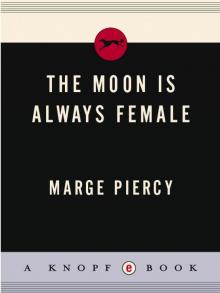 Moon Is Always Female
Moon Is Always Female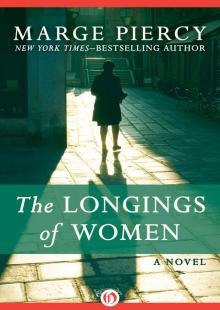 The Longings of Women
The Longings of Women Circles on the Water
Circles on the Water Summer People
Summer People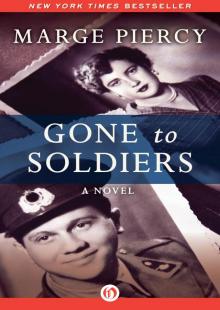 Gone to Soldiers: A Novel
Gone to Soldiers: A Novel The Hunger Moon: New and Selected Poems, 1980-2010
The Hunger Moon: New and Selected Poems, 1980-2010 Vida
Vida Fly Away Home
Fly Away Home He, She and It
He, She and It So You Want to Write
So You Want to Write Small Changes
Small Changes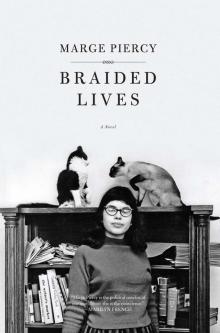 Braided Lives
Braided Lives Lord Valentine's Castle
Lord Valentine's Castle Dance the Eagle to Sleep
Dance the Eagle to Sleep City of Darkness, City of Light
City of Darkness, City of Light The High Cost of Living: A Novel
The High Cost of Living: A Novel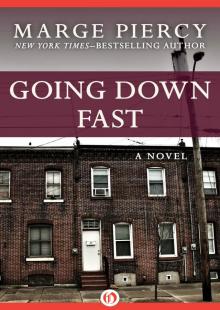 Going Down Fast: A Novel
Going Down Fast: A Novel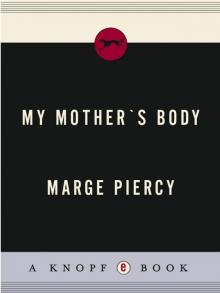 My Mother's Body
My Mother's Body Storm Tide
Storm Tide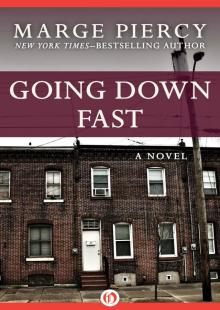 Going Down Fast
Going Down Fast The Third Child
The Third Child The Hunger Moon
The Hunger Moon The Cost of Lunch, Etc.
The Cost of Lunch, Etc. Sex Wars
Sex Wars The High Cost of Living
The High Cost of Living Made in Detroit
Made in Detroit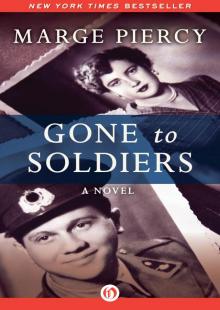 Gone to Soldiers
Gone to Soldiers